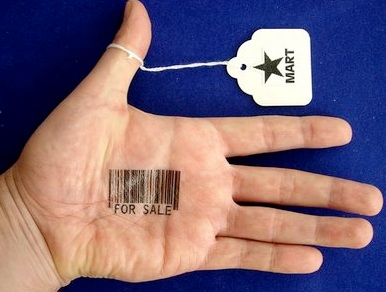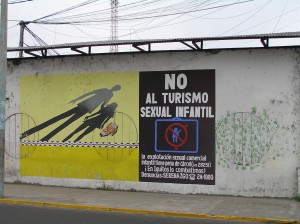Do you watch ESPN? Great channel, right? Did you also know that ESPN is inadvertently supporting the sex trade of American children? ESPN Inc. advertises through Village Voice Media – who in turn advertises American children on their classified escorts site Backpage.com.
Shared Hope International has documented over 200 children who have been sold for sex on Backpage.com in the United States, most victimized in the last 3 years. Shared Hope believes that just one trafficked child is enough reason to act. However, Village Voice Media, the parent-company of Backpage.com, has taken no responsibility for the victimized children and refuses to shut down their escorts’ site to deter the growing number of victims. Also, Village Voice Media is projected to make $26 million this year from their online escort section alone.
Multiple states are trying to take action to protect children from being exploited through online classified sites like Backpage.com’s adult section through legislative action but currently the company is claiming protection under the 1st Amendment and the Communications Decency Act of 1996 which states that a business is not liable for third-party content. Nonetheless, 51 Attorneys General, 19 U.S Senators, 2000 multi-faith religious leaders, 53 leading anti-trafficking experts and organizations and over 250,000 people have stood up and demanded that Village Voice Media shuts down Backpage.com’s escort section. And it is definitely time for Village Voice Media to listen to them.
At this point, Village Voice has proven that they are uninterested in losing revenue made off the commercial exploitation of our children; therefore it is time for Americans to rise up in defense of our children being sold on Backpage.com.
ESPN is one of 40 companies which U.S. Senators Mark Kirk (R-Ill.), Richard Blumenthal (D- Conn.), Marco Rubio (R-Fla.) and John Cornyn (R-Tex.) wrote a letter in April 2012 asking them to withdraw their advertising from Village Voice Media. Multiple companies including Starbucks, T-Mobile and AT&T removed advertisement from Village Voice newspapers because they did not want to be associated with domestic child sex trafficking.
As a consumer you have a great deal of power, so it is up to you to harness that power for the protection of children from sex slavery and sex trafficking. Inform these companies that you want domestic child sex trafficking eradicated and for that to happen, they must stop advertising with Village Voice Media. If they don’t, you will be forced to remove your economic support from their company.
Businesses identified by the Groundswell Campaign who continue to support child sex trafficking by advertising with Village Voice Media:
2929 Entertainment
American Apparel, Inc.
American Automobile Association
Android
Angelika Film Center
Anheuser-Busch Companies, Inc.
Arizona Diamondbacks
Atlantic Broadband
Austin Convention and Visitors Bureau
Bacardi USA, Inc.
Blick Art Materials
Blue Man Productions, Inc.
Brooklyn Museum
Buffalo Wild Wings
Cancer Fund of America, Inc.
Champs Sports
Charter Communications
Cirque du Soleil
Clear Channel Communications, Inc.
COLUMBIA UNIVERSITY – New York State Psychiatric Institute
CraftWorks Restaurants and Breweries, Inc.
Dave and Busters
Denver Botanic Gardens, Inc.
Diageo PLC
Disney
ESPN, Inc.
Focus Features (Moonrise Kingdom)
Foot Locker, Inc.
Foursquare
Guitar Center
H.D. Buttercup
Hard Rock Café
Harrah’s Resorts
HOOTERS
Houston Symphony
Hyatt Hotels Corporation
Icelandair
J&R
JR Electronics
KCRW
LA Philharmonic
Landmark Sunshine Cinema
Landmark Theatres
Lincoln Center Theater
Lions Gate Entertainment Corporation
Lululemon
Marriott International, Inc
Mayo Clinic
Mesa Arts Center
MetroPCS
MGM Resorts International
Mike’s Hard Lemonade Co.
Miller Light
Minnesota Orchestra
Minnesota Wild
Monsanto
MOUNT SINAI SCHOOL OF MEDICINE – Mood and Personality Disorders Research Program Department of Psychiatry
MTV2
New Belgium Brewing Company, Inc.
P.F. Chang’s China Bistro, Inc.
Sony Pictures Entertainment, Inc.
St. Louis Rams
The Bowery Presents
The Salvation Army
Ticketfly
Total Bank
Toyota Motor Corporation
United Way Worldwide
University of California, Los Angeles
University of Denver
Veo optics
Walt Disney Pictures
Warner Brothers Entertainment
Whole Foods
YWCA of Minneapolis
YWCA Twin Cities
Zagat
“How many kids need to be exploited before they [Backpage.com] change their business model?” – Ernie Allen, National Center for Missing and Exploited Children
 Stories like Kelly’s have become all too common in today’s society. Through the Protected Innocence Initiative, Shared Hope International seeks to help victims like Kelly by making sure the laws properly criminalize domestic minor sex trafficking.
Stories like Kelly’s have become all too common in today’s society. Through the Protected Innocence Initiative, Shared Hope International seeks to help victims like Kelly by making sure the laws properly criminalize domestic minor sex trafficking. Child sex tourism
Child sex tourism





